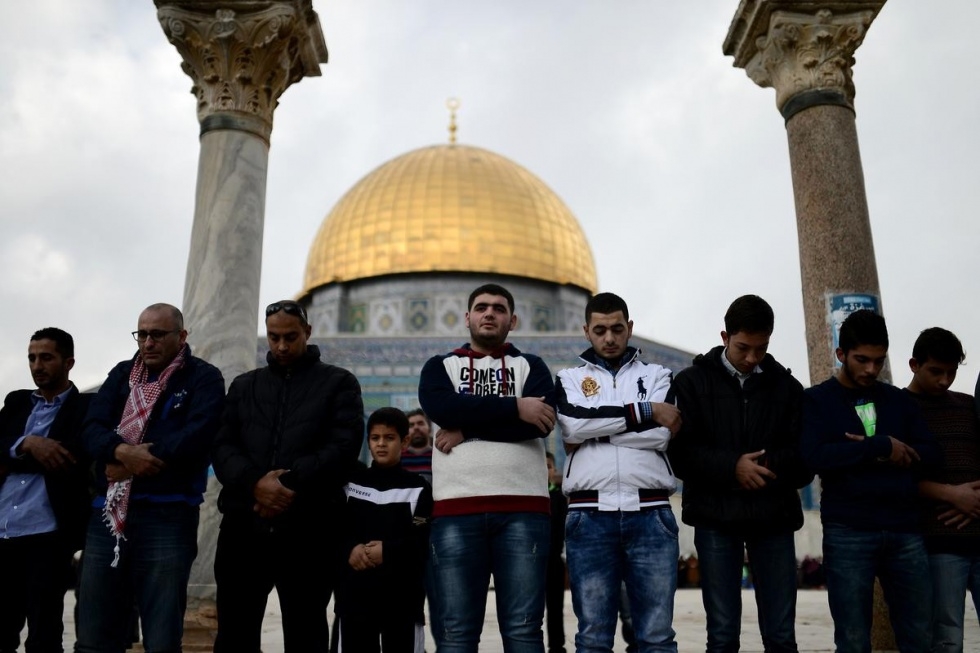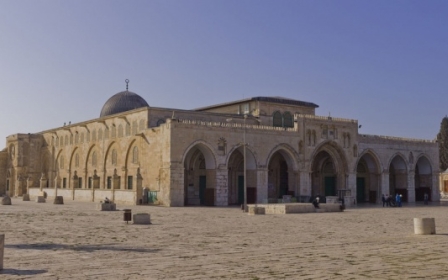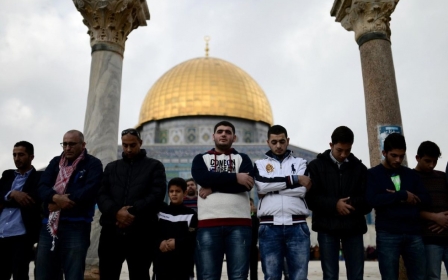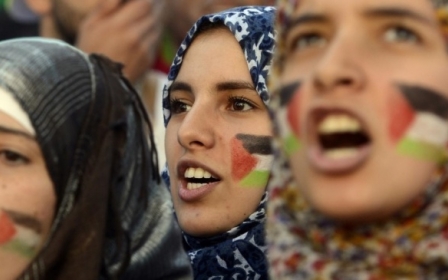Hanan Ashrawi: Oslo Accord left Jerusalemites at mercy of Israel

Israel has systematically targeted Jerusalemites, putting them under a triple siege, and matters in the city have now come to a head, Hanan Ashrawi, the veteran Palestinian negotiator said in an interview with Middle East Eye.
“Israel practised some of the cruellest measures against Jerusalemites; exorbitant taxes, no services, forming the Palestinian areas into ghettos, stealing their land, leaving them with 12 to 13 percent of their own land, and thousands upon thousands of ID confiscations, the separation of families. Violence begets violence. Now matters have come to a head,” Dr Ashrawi said.
Dr Ashrawi, who herself has a Jerusalem ID, and whose daughters had their IDs confiscated, said it was a fundamental flaw of the Oslo Accords to postpone the issue of Jerusalem.
“I would never have signed the DOP [Declaration of Principles] relinquishing power over Jerusalem. I have a Jerusalem ID. My daughters have Jerusalem IDs before they confiscated them. We call ourselves the Madrid/Washington group. We are not the Oslo group, we had a totally different approach. We didn’t postpone the real issues. We discussed human rights, Jerusalem, statehood, borders. We demanded control over the population register and the land register. Israel is in control of both, so how can you ever be free? So no wonder Jerusalemites feels abandoned, vulnerable and targeted. Because Israel has systematically targeted them.”
Neither the PA nor the PLO can function in Jerusalem. Dr Ashrawi said that Israel tore up the promises its own former foreign minister, Shimon Perez made in a letter to his Norwegian counterpart, Johan Holst to protect the Palestinian institutions of Jerusalem.
In the letter dated 11 October, 1993, Perez wrote, "All the Palestinian institutions of East Jerusalem, including the economic, social, educational and cultural, and the holy Christian and Moslem places, are performing an essential task for the Palestinian population. Needless to say, we will not hamper their activity; on the contrary, the fulfilment of this important mission is to be encouraged.”
After attempts by both Netanyahu, in his first term as prime minister, and then Jerusalem mayor, Ehud Olmert, Orient House, the former headquarters of the PLO was closed down by Ariel Sharon during the Second Intifada.
“To add not just insult to injury and to make it totally abhorrent to our ideology and religion, now we have this whole assault on the Haram al-Sharif and the al-Aqsa Mosque. It is really provoking a religious war. It is provoking religious sentiment,” Dr Ashrawi, a non-practising Anglican, said.
Dr Ashrawi said that the attempt to force Palestinians to accept Israel as a Jewish state had a political motive. "They do not want the Palestinian refugees to have the right to return. They will legislate a law of return for any Jew anywhere, whether they are from Ethiopia or Brooklyn or Poland, wherever, but we have no right to return, the Palestinians who have land deeds, keys to their homes, who have been living there for centuries, who were expelled by force have no right of return. And this acceptance of this Jewishness of the state means automatically we condone not just Zionism, but the exclusion of Palestinians. This completes the 1948 Nakba (Catastrophe).”
Dr Ashrawi said the Palestinian youth were leaderless and it was vital to revitalise the PLO with fresh elections, although she acknowledged the difficulty of holding such elections to the Palestinian National Council, the parliament, among the Palestinian refugee camps in Lebanon, Syria and Jordan.
“Yes, people are unhappy with the leadership. It is a system set in place, set in its ways and it is not renewing itself and it is not responding to the needs of the young. It needs to be able to formulate strategies and policies professionally and it needs to respond to the needs of the people. If you don’t have elections, you don’t feel the urgency, the imperative of change. Because they will not hold you accountable. They will not vote you out of office.”
The first woman to be elected to the PNC, Dr Ashrawi said, "When I was elected to it, I thought I could inject some new spirit, some energy and it is an uphill struggle. It is set in its ways. It needs to be challenged. It needs to be reformed.
“We can start with what exists. We can start with the departments that have been weakened. We can start with the PLO, the institutional political decision-making which has been weakened and undermined. We can start with the PLO responsibilities and mandate to serve Palestinians everywhere which has been undermined by the fact that the PLO came here and is living under the occupation.”
Dr Ashrawi criticised both Fatah and Hamas for wanting to “divvy up” the spoils. “You need to come up with agreements on how to open up the system and make room for young people. The problem is even if tomorrow you have a revolution and the young take over, which I don’t mind. I think they should, they will inherit an impossible situation.”
She said the government of national accord was not working and neither Fatah nor Hamas were doing anything about it. She accused Hamas of not wanting to relinquish security control of Gaza; “Hamas wants to keep its militias and wants to keep its security apparatus intact. Why should the PA send or the president send his guards to the crossing points if behind them, there are Hamas militias? You cannot do that.”
But she was bitter too in her criticism of the government ministers for not stepping foot in Gaza.
“You have a big strong government: Go there, take over. Don’t sit back and say “Well, the deputy ministers have created a shadow government.” Why did they? Because you were not there. Go there, take over. Take with you a whole bunch of technocrats and professionals. They sent one minister of health and he was threatened, beaten-up, turned back. So they use this as an excuse to send nobody else. So I said no. Now is the time to be strong to have a big showing. Go there and take over the ministries. Hold them accountable. Check what they have done and give them tasks to do. Put together their plan and then with the reconstruction which is the second task and it has to be done simultaneously. We cannot just provide relief.”
All Palestine was suffering because of the continuing rift between Fatah and Hamas, she said. She said there were two camps about the future of the government of national accord. One was to expand the current government, to give it more ministers and more responsibility. The second was to create a government of national unity, which would then be boycotted by Israel and the international community.
“Do we go back to 2006 or not? Because the Palestinians were sanctioned when they elected Hamas. So now if Hamas is part of the government, what will happen? Or will they use the Lebanese precedent for example, the world talking to all ministers but the Hezbollah ones?”
“So it a real dilemma. I believe you need strong, national figures capable of taking over these institutions. Hamas needs to know it cannot want one thing and it’s opposite simultaneously. You cannot blow up peoples’ homes or cars and then say we don’t know and it is not our fault. Hamas knows where an ant walks in Gaza. Fatah has to know that Hamas is not going to disappear. It is part of the political fabric. It has its own institutions, its own people, its own constituency and you have to learn how to live with it. You cannot have a monopoly over the political system and not be challenged. So you have to come to a modus operandi. Unfortunately factionalism has been a major detriment.”
New MEE newsletter: Jerusalem Dispatch
Sign up to get the latest insights and analysis on Israel-Palestine, alongside Turkey Unpacked and other MEE newsletters
Middle East Eye delivers independent and unrivalled coverage and analysis of the Middle East, North Africa and beyond. To learn more about republishing this content and the associated fees, please fill out this form. More about MEE can be found here.




